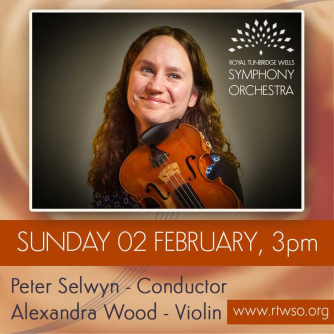Details
Assembly Hall Theatre
Crescent Road
Tunbridge Wells
Kent
TN1 2LU
England
Programme
Gioachino Rossini – Italian girl in Algiers: Overture
Ludwig van Beethoven – Violin Concerto in D major, Op.61
~ Interval ~
Jean Sibelius – Symphony no.2 in D major, Op.43
Performers
Peter Selwyn – Conductor
Alexandra Wood – violin
Royal Tunbridge Wells Symphony Orchestra
Other concerts in this Series (+)
Programme Note
The composer dubbed ‘Mr Crescendo’ gets this afternoon’s concert under way. The whole of Rossini’s opera The Italian Girl in Algiers is still regularly staged, unlike many other operas where only the overtures get performed nowadays. The overture begins with a slow introduction featuring an exposed oboe solo. Then, as one might expect, momentum and volume soon increase and we’re off in typical Rossini fashion racing towards the finish line.
With the four soft drum beats of its opening, Beethoven’s Violin Concerto makes a quiet, almost insignificant, entrance, in sharp contrast to the famous four notes opening his Symphony No. 5 which hammer out their intent. The concerto did NOT have a successful premiere; there were time pressures on Beethoven and the soloist and the work was under-rehearsed. Beethoven probably died not realising how popular his concerto would become. Our soloist today, playing this now very popular concerto, is renowned violinist Alexandra Wood who will be making her sixth appearance with the RTWSO.
Like Sir Winston Churchill, Sibelius is credited with several memorable, and often amusing or caustic, quotations. He hated critics, “Pay no attention to what the critics say; no statue has ever been erected to a critic,” but he was also highly self-critical, revising or completely re-writing many of his works throughout his career. His Symphony No. 2 which ends this concert is very much a case in point. He made numerous revisions before the premiere, and even then the critics were divided over its success; but the public loved it. Today it is recognised as one of the greatest symphonies ever written. This exhilarating work, first performed in Helsinki in 1902 with Sibelius himself conducting, reflects the changing moods of the Finnish people as they recovered their national spirit after years of Russian rule, and it concludes in a furore of patriotic fervour.

 Your events at Classical Events
Your events at Classical Events

